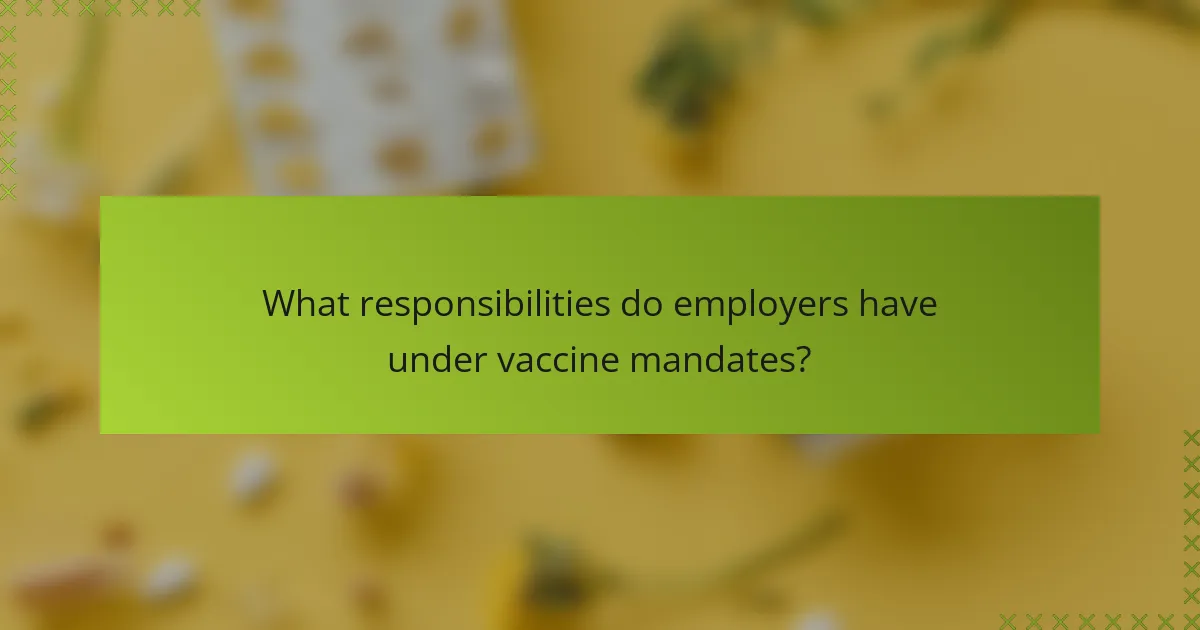Vaccine mandates in the workplace are shaped by a blend of central and state regulations, requiring employers to balance compliance with employee rights and health considerations. To foster a safe environment, employers should implement clear policies, provide education, and monitor adherence to these mandates. Employees, on the other hand, possess specific rights related to vaccination, including the ability to refuse under certain circumstances and protections for their privacy. Understanding these dynamics is essential for navigating workplace policies effectively.

What are the legal requirements for vaccine mandates in India?
In India, vaccine mandates are governed by a combination of central and state regulations, which outline the legal framework for enforcing vaccination in workplaces. Employers must ensure compliance with these mandates while respecting employee rights and health considerations.
Central Government guidelines
The Central Government of India has issued guidelines that encourage vaccination as a public health measure. These guidelines recommend that employers facilitate vaccination drives and ensure that employees are informed about the benefits and safety of vaccines.
While the central guidelines promote vaccination, they do not impose strict mandates, leaving room for state governments to implement specific requirements based on local conditions. Employers should stay updated on any directives from the Ministry of Health and Family Welfare regarding vaccination policies.
State-specific regulations
Each state in India has the authority to establish its own regulations regarding vaccine mandates. Some states may require certain sectors, such as healthcare or education, to ensure that employees are vaccinated, while others may adopt a more lenient approach.
Employers should review their respective state regulations regularly, as these can change in response to the evolving public health situation. It is crucial to communicate any state-specific requirements to employees to ensure compliance and safety.
Industry-specific mandates
Certain industries in India may have specific vaccine mandates due to the nature of their work. For example, healthcare facilities often require all staff to be vaccinated to protect vulnerable populations.
Employers in these sectors should implement clear policies regarding vaccination, including potential consequences for non-compliance. It is advisable to provide employees with information about the vaccines and support for accessing vaccination services.

How can employers ensure workplace compliance with vaccine mandates?
Employers can ensure workplace compliance with vaccine mandates by establishing clear policies, providing education, and implementing monitoring strategies. These steps help create a safe environment while respecting employee rights and responsibilities.
Implementing vaccination policies
Employers should develop comprehensive vaccination policies that outline requirements, exceptions, and consequences for non-compliance. These policies must align with local regulations and be communicated effectively to all employees.
Consider including provisions for medical or religious exemptions, ensuring that the policy is flexible yet firm. Regularly review and update the policy to reflect any changes in public health guidelines or legal requirements.
Employee education and training
Providing education about the benefits and safety of vaccines is crucial for fostering a compliant workplace. Employers can organize informational sessions, distribute literature, and share resources from reputable health organizations.
Training should also cover the specifics of the vaccination policy, including how employees can report their vaccination status and what to expect if they choose not to comply. Engaging employees through discussions can help address concerns and misconceptions.
Monitoring and enforcement strategies
Employers need to establish monitoring systems to track employee vaccination statuses and ensure compliance with the policy. This may involve collecting documentation and maintaining records securely while respecting privacy laws.
Enforcement strategies should be clear and consistent, outlining the steps taken for non-compliance, which may include disciplinary actions. Regular audits can help identify gaps in compliance and areas for improvement, ensuring that the workplace remains safe for all employees.

What rights do employees have regarding vaccine mandates?
Employees have specific rights concerning vaccine mandates, including the right to refuse vaccination under certain conditions, the possibility of medical or religious exemptions, and protections for their privacy regarding vaccination status. Understanding these rights is crucial for navigating workplace policies effectively.
Right to refuse vaccination
Employees can refuse vaccination based on personal beliefs or medical reasons, but this right may be limited by workplace policies and local laws. Employers often have the authority to enforce vaccination requirements, especially in sectors where public health is a priority, such as healthcare and education.
When refusing vaccination, employees should communicate their reasons clearly to their employer and be prepared for potential consequences, such as reassignment or termination, depending on the company’s policies and applicable laws.
Medical and religious exemptions
Many jurisdictions allow for medical and religious exemptions to vaccine mandates. Employees seeking a medical exemption typically need to provide documentation from a healthcare provider, while religious exemptions may require a personal statement outlining the belief that conflicts with vaccination.
Employers are generally required to consider these exemptions but can still impose reasonable accommodations, such as remote work or regular testing, to maintain workplace safety. Employees should familiarize themselves with their rights and the specific procedures for requesting exemptions.
Employee privacy protections
Employees have the right to privacy regarding their vaccination status, which means employers should handle this information confidentially and only share it with those who need to know for compliance purposes. Laws such as the Health Insurance Portability and Accountability Act (HIPAA) in the U.S. provide some level of protection for health information.
To safeguard their privacy, employees should inquire about how their vaccination status will be recorded and stored, and what measures are in place to protect this sensitive information. It’s advisable to review company policies and state laws to understand the extent of privacy protections available.

What responsibilities do employers have under vaccine mandates?
Employers have a duty to ensure compliance with vaccine mandates, which includes implementing policies that promote vaccination while respecting employee rights. This involves providing accommodations, maintaining a safe work environment, and documenting efforts to comply with regulations.
Providing accommodations
Employers must consider reasonable accommodations for employees who cannot be vaccinated due to medical or religious reasons. This may include allowing remote work, modifying job duties, or providing additional personal protective equipment.
It’s essential to engage in an interactive process with employees to determine appropriate accommodations. Employers should be aware of applicable laws, such as the Americans with Disabilities Act (ADA) in the U.S., which may influence accommodation decisions.
Maintaining workplace safety
Employers are responsible for maintaining a safe workplace, which includes implementing health protocols to minimize the risk of COVID-19 transmission. This may involve regular cleaning, enforcing mask-wearing, and ensuring proper ventilation in the workplace.
In addition to vaccination, employers should consider other safety measures, such as social distancing and health screenings. Keeping employees informed about safety practices can help foster a culture of health and compliance.
Documenting compliance efforts
Employers should maintain thorough documentation of their compliance efforts regarding vaccine mandates. This includes records of vaccination status, accommodations provided, and safety measures implemented.
Proper documentation not only helps in demonstrating compliance with regulations but also protects employers in case of disputes. Regular audits of compliance efforts can ensure that policies remain effective and up-to-date with changing regulations.

How do vaccine mandates affect employee morale and retention?
Vaccine mandates can significantly impact employee morale and retention by creating a sense of safety or, conversely, tension within the workplace. Employees may feel more secure in a vaccinated environment, but those opposed to mandates might experience dissatisfaction, leading to higher turnover rates.
Impact on workplace culture
The implementation of vaccine mandates can alter workplace culture by fostering a climate of health and safety. Employees who support vaccination may feel more valued and protected, while those against it might feel marginalized. This divide can lead to conflicts, affecting teamwork and collaboration.
Organizations should consider open communication strategies to address concerns and promote understanding. Encouraging dialogue can help bridge gaps and maintain a cohesive workplace culture despite differing views on vaccination.
Retention strategies during mandates
To retain employees during vaccine mandates, companies should focus on transparency and support. Providing clear information about the reasons for the mandate and its benefits can help alleviate fears and resistance. Offering flexible work arrangements, such as remote work options, may also appeal to those hesitant about vaccination.
Additionally, consider implementing incentives for vaccinated employees, such as bonuses or extra time off. These strategies can enhance morale and encourage compliance, ultimately aiding in retention during challenging times.

What are the potential legal challenges to vaccine mandates?
Vaccine mandates can face various legal challenges, primarily centered around individual rights, employment laws, and public health regulations. Key issues often include claims of discrimination, violations of privacy, and the legality of employer-imposed health requirements.
Litigation trends in India
In India, legal challenges to vaccine mandates have been emerging, particularly concerning the balance between public health and individual rights. Courts have been evaluating cases where employees contest mandatory vaccination policies, often citing personal liberty and bodily autonomy as key arguments.
Recent rulings indicate a trend towards upholding public health measures while also recognizing the need for reasonable accommodations for those with valid medical or religious exemptions. Employers are advised to implement clear policies that comply with local laws to mitigate legal risks.
Case studies of successful challenges
Successful challenges to vaccine mandates often hinge on demonstrating that the mandate violates specific rights or legal protections. For instance, in some jurisdictions, employees have successfully argued that mandates infringe on their religious beliefs or medical conditions.
One notable case involved a healthcare worker who was exempted from a vaccine mandate due to a documented medical condition. This case highlighted the importance of employers conducting thorough assessments of exemption requests and ensuring compliance with anti-discrimination laws.
